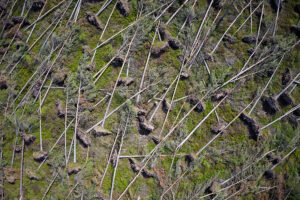Biogaz Gardanne Project reports successful steam-oxygen gasification tests

The tests were carried out in partnership with the Energy from Biomass and Wastes (ERBE) team, part of the Laboratoire d'Etudes et de Recherche sur le Matériau Bois (LERMAB) at Université de Lorraine (UL) in Epinal, France.
The work formed part of feasibility work on the Biogaz Gardanne project awarded to the Company in March 2023 by the Préfet de la Région Provence-Alpes-Côte-d'Azur in France (the project).
The tests confirmed that similar results to those achieved with EQTEC steam-oxygen gasification technology at the LERMAB facility can be directly applied at commercial scale, for the project and other plants seeking to produce advanced biofuels, according to EQTEC.
The LERMAB facility is a smaller version of a commercial-scale plant, with complete, end-to-end capabilities for feedstock conversion into synthesis gas.
The facility runs an autonomous and autothermic process, as will EQTEC installations in commercial-scale plants - they will be able to operate without a supply of external energy.
The three objectives of the tests were: to assess the feasibility of steam-oxygen gasification of Grade B waste wood; to validate in a live environment the simulation results already produced through EQTEC's proprietary simulation model; and to evaluate the quality of the syngas produced through the process toward its input into the subsequent methanation process.
In relation to the first objective, the EQTEC technology demonstrated continuous, efficient and productive conversion of Grade B waste wood. This is made complex by contamination with non-reactive materials such as glass or metal that must be removed from the fluidised bed to avoid low-efficiency reactions. The same goes f0r other materials such as polymers, which contain compounds that, left unmanaged, would impact the process and syngas quality.
In achieving the second objective, the test results provided a clear match with the data produced through EQTEC's proprietary simulation model. This included stable fluidisation and temperature in the gasification reactor, which indicates efficient oxygen distribution and feedstock conversion, as well as evolution of syngas composition through the process.
The third objective was met as the syngas produced through the steam-oxygen gasification approach was of high quality, with much larger proportions of hydrogen and carbon monoxide than typically produced through the air-blown gasification approach. This indicates strong potential for upgrading of the gas to support efficient methanation and production of renewable natural gas (RNG).
Additionally, the tests validated the responsiveness of EQTEC's proprietary control systems over the process, testing changes to process parameters and quick response of the gasifier reactions to create stable processing through management of temperature, pressure and other factors to optimise gas composition.
The tests were undertaken on the basis of a design concept for the project that envisions a waste-to-energy facility that would cleanly and sustainably convert up to 100,000 tonnes per year of Grade B waste wood into RNG for injection into the natural grid, through an integrated gasification and methanation process.
The Project is currently completing a holistic feasibility on market dynamics, site specifications and technical requirements, and the Tests provide essential validation to the proposed waste-to-RNG solution with EQTEC's proprietary and patented steam-oxygen gasification technology.
Yoel Alemán, CTO of EQTEC, commented: "These tests represent an important milestone for EQTEC in our technology innovation roadmap. The development of a steam-oxygen gasification process is key to application of EQTEC syngas to generation of a diversity of offtakes including hydrogen, methane or other biofuels (including sustainable aviation fuel or SAF), from a wide range of fuels including biomass, refuse-derived fuel (RDF), plastics and others.
"There are few successful steam-oxygen gasification facilities in the world, and we believe our success with these tests puts us at the forefront of clean, waste-to-value capabilities. From a technical perspective, we were pleased at how smoothly the technology performed throughout. The data we gathered will allow us to fine-tune our proprietary process capabilities and we look forward to applying the new knowledge to commercial-scale plants."
Yann Rogaume, Professor and head of the ERBE Team, commented: "The focus of these tests was not simply to determine the syngas quality obtained from conversion of Grade B wood waste, but to demonstrate the stability of the fluidisation and gasification processes and evaluate the variation of the process parameters on the thermochemical conversion process to optimise the production of syngas. We are satisfied that the tests indicate an efficient and effective conversion of a complex feedstock into syngas that is capable of supporting a high yield methanation process."
David Le Saint, managing director of EQTEC France SAS, commented: "The Biogaz Gardanne project is one of several renewable energy projects in France enjoying strong community and government support at local, prefectural and national levels. It is indicative of France's progressive approach to development of new energy infrastructure, and we are delighted to be a part of helping to deliver that.
"For EQTEC, the active application of the steam-oxygen capabilities we installed in 2022 at the UL facility supports our innovation agenda, our business strategy and the Biogaz Gardanne project directly. The conclusions of these tests are important for demonstrating EQTEC's capabilities in applying our versatile syngas technology to a variety of applications, including RNG, which is rapidly becoming a growth market in France. I look forward to adding these exciting results to our feasibility work and to driving the project forward as a result."


























